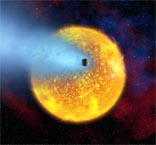Astronomers observe `hot-headed’ planet with wild temperature swings
 Pasadena (California, US), Jan 29 : Astronomers have observed a planet that heats up to red-hot temperatures in a matter of hours before quickly cooling down.
Pasadena (California, US), Jan 29 : Astronomers have observed a planet that heats up to red-hot temperatures in a matter of hours before quickly cooling down.
Using NASA''s Spitzer Space Telescope, the astronomers have identified the "hot-headed" planet as HD 80606b.
They describe it as a gas giant that orbits a star 190 light-years from Earth.
It was already known to be quite unusual, with an orbit shuttling it nearly as far out as Earth is from our sun, and much closer in than our planet Mercury.
They claimed that they used Spitzer, an infrared observatory, to measure heat emanating from the planet as it whipped behind and close to its star.
In just six hours, the planet''s temperature rose from 800 to 1,500 Kelvin (980 to 2,240 degrees Fahrenheit), claimed astronomer Greg Laughlin of the Lick Observatory, University of California at Santa Cruz.
"This is the first time that we''ve detected weather changes in real time on a planet outside our solar system," said Laughlin, the lead author of a new report about the discovery appearing in the January 29 issue of Nature.
HD 80606b was originally discovered in 2001 by a Swiss planet hunting team led by Dominique Naef of the Geneva Observatory in Switzerland.
Using a method known as the Doppler-velocity technique, the Swiss team learned that the planet is wildly eccentric, with an orbit more like a comet''s than a planet''s.
The planet takes about 111 days to circle its star, but it spends most of its time at farther distances while zipping through the closest part of its orbit in less than a day. This is a consequence of Kepler''s Second Law of Planetary Motion, which states that orbiting bodies -- planets and comets -- sweep out an equal area in equal time.
Spitzer observed HD 80606b before, during and just after its closest passage to the star in November of 2007, as the planet sizzled under the star''s heat.
"By studying this planet under such extreme circumstances, we figure out how it handles heat -- does it retain it or dissipate it? In this case, the answer is that the planet releases the heat right away," said Laughlin.
"We were essentially able to perform the ''thought experiment'' - what would happen to a planet like Jupiter if we could drag it very close to the sun?" (ANI)